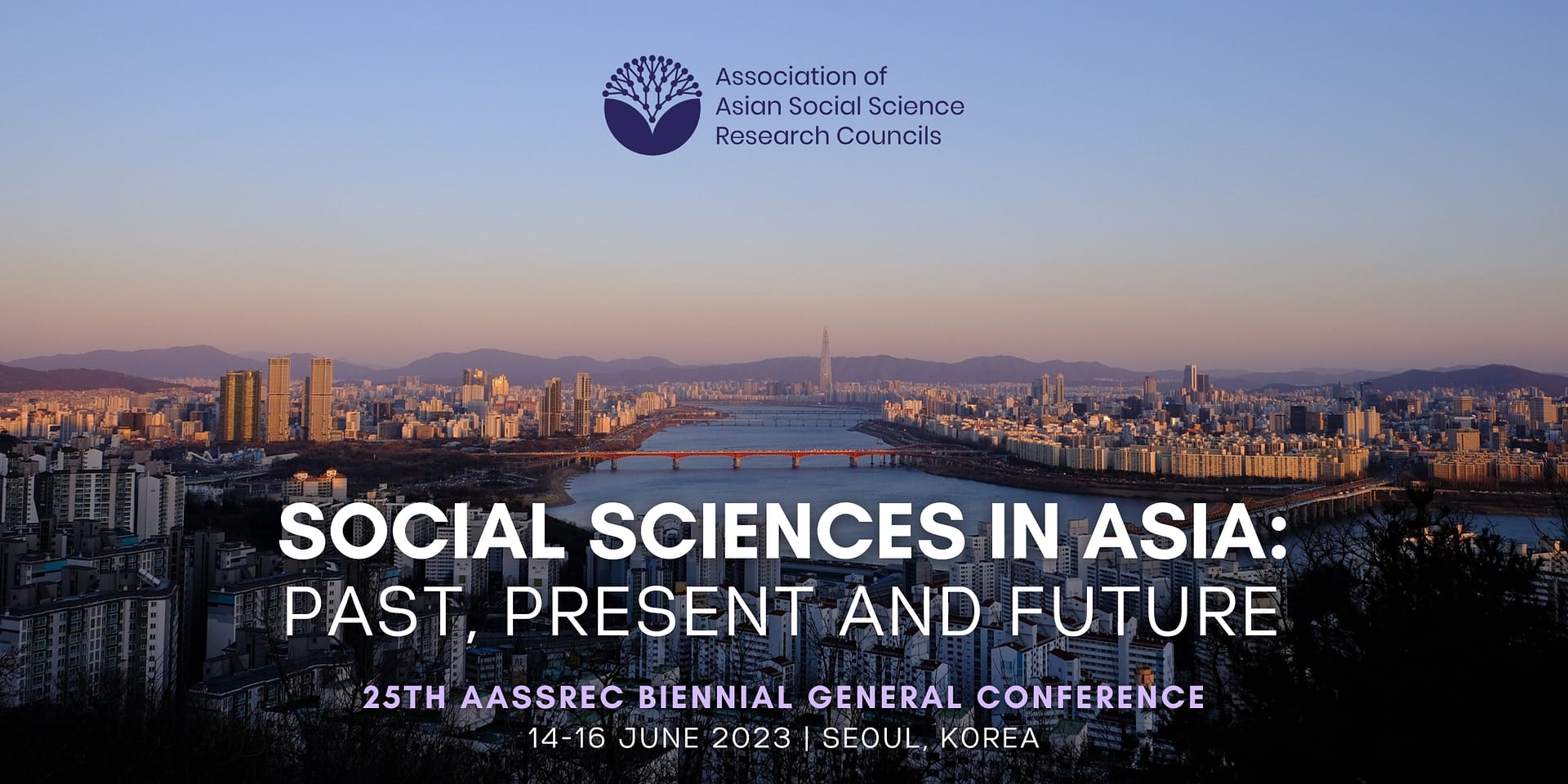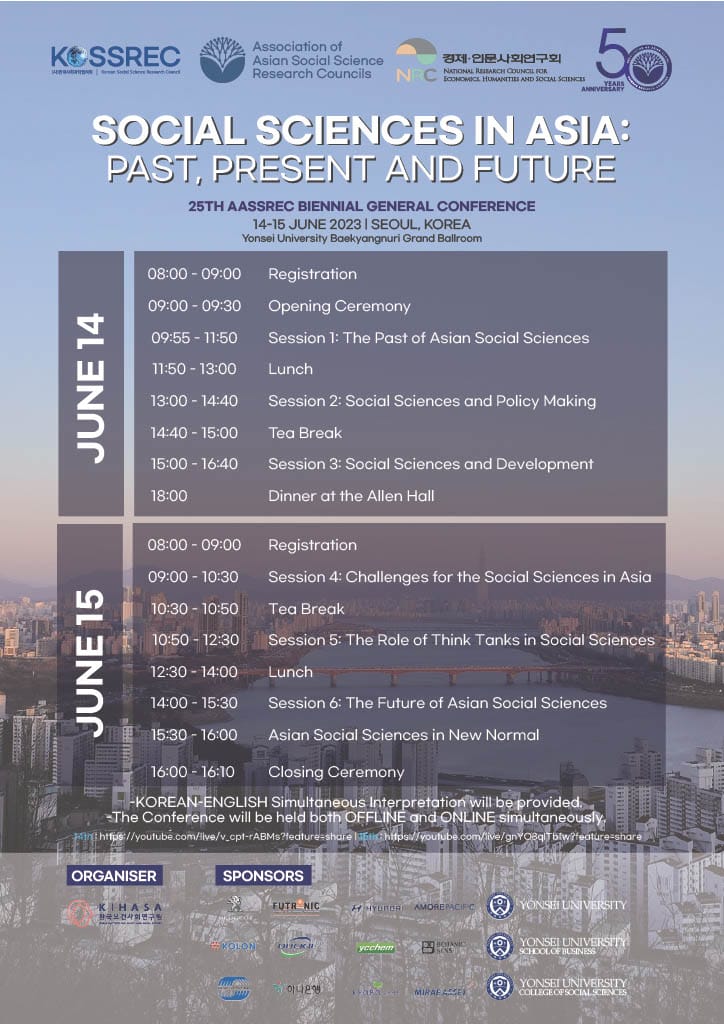
Social Sciences in Asia: Past, Present and Future
14-16 June 2023 – Yonsei University, Seoul, Korea and streamed live online
Social science researchers and knowledge have had a profound impact in Asia over the past century, from helping achieve relatively stable economic growth to supporting the establishment of stable liberal democracies across the region. The 77 years since the end of WWII has seen profound structural changes including the fall of Marxism, the decline of state-centric political systems, the emergence of neoliberal paradigms, and the progress of globalization. These processes have been accompanied by a change in social science methodologies and theoretical frameworks, including:
- an increased focus on empirical and statistical methods;
- the emergence of new theoretical models including behaviouralism, structural functionalism, neo-institutionalism, regime theory and rational choice models; and
- a renewed focus on individual human actors and the relationship between structures and actors in determining social outcomes.
At the same time, this global shift in social science has been problematic for Asian scholars, for the following reasons:
- The American centrality in the fields of social science could be seen to have been excessively amplified, with a tendency of statistical and synchronic analysis to generalize regional and national characteristics, and English language editorial policies promoting the hierarchical division of study.
- Pro-science and pro-policy stances of academia encouraged the trend of academic industrialization, which prioritizes the production of knowledge as products rather than the discovery of truth and the suggestion of value-added alternatives by scholars.
- Actor-based research showed possible limitations with respect to topics emerging in the 21st century such as the formation of the new Cold War structure, the social impact of Industry 4.0, and the change in the demographic structures. These social phenomena manifest differently in Asian countries located in Rim Land where geopolitical conflict between continents and maritime powers is inevitable and limit the independence of individual actors.
Looking forward
In the 21st century, the world is facing fundamental structural changes in politics, economy, and society. It is impossible to ignore the calls for social scientific alternatives to address these changes. Globalization is coming to an end, and confrontations between regions, countries, and civilizations are showing signs of intensifying. Accordingly, the Association of Asian Social Science Research Councils intends to examine the past and present paths of social science in Asia, identify major problems to be faced, and begin an attempt to search for academic alternatives. Furthermore, the AASSREC intends to derive variables that cannot be well understood from the perspectives of politicians and bureaucrats, and to suggest appropriate directions for policy enactment. This will break the vicious cycle of designing and disposing of policies according to the whims of politicians and establish sustainable policies regardless of regime changes so that Asian countries can overcome the crisis of the new Cold War and extend the period of peace. We hope to create a setting in which the academic and intellectual authority that has been maintained under Confucian traditions will create an opportunity to contribute to the development of Korea and the Asian region as a whole.
Conference Format
The 25th AASSREC Biennial General Conference was hosted by the Korean Social Science Research Council (KOSSREC) and the National Research Council for Economics, Humanities and Social Sciences (NRC) in Korea. The conference was held at Yonsei University from 14-15 June 2023 and was streamed live on YouTube.
AASSREC celebrates its 50th anniversary in 2023. Thus, the conference provided members with an opportunity to look back on Asian social sciences so far, discuss what role social sciences are currently playing in policymaking in each country, and what direction Asian social sciences should take in the future.
Session 1: Asian Social Sciences in the Past: The background of the introduction of social sciences and how it has developed in Asia.
Sessions 2, 3 & 4: Asian Social Sciences in the Present: Contending issues of social sciences, the discourse of social sciences, and the role of social sciences in policy making in each country.
Session 5 & 6: Asian Social Sciences in the Future: What direction should social sciences take in the future? How social sciences can contribute to society.
Simultaneous Korean-English translation was provided.
Conference Program
View and download the conference program (including session times and speakers), and abstracts of the presentations.

Conference Video
Take a look at some of the official photos and highlights from the two day conference in Seoul in the video below.
Conference Timeline
| 5 December 2022: | Call for Papers |
| 5 February 2023: | Deadline for Abstract Submission |
| 5 April 2023: | Notification of paper or abstract acceptance |
| 14 April 2023: | Conference Registration Open |
| 5 May 2023: | Deadline for Full Paper Submission |
| 14-15 June 2023: | Conference |

Recent Comments